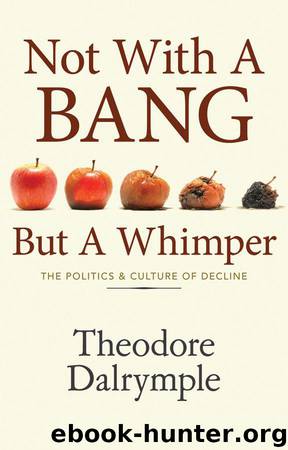Not With a Bang But a Whimper: The Politics & Culture of Decline by Theodore Dalrymple

Author:Theodore Dalrymple [Dalrymple, Theodore]
Language: eng
Format: epub
Publisher: Monday Books
Published: 2011-01-30T23:00:00+00:00
DON’T LEGALISE DRUGS
THERE IS A PROGRESSION in the minds of men: first the unthinkable becomes thinkable, and then it becomes an orthodoxy whose truth seems so obvious that no one remembers that anyone ever thought differently. This is just what is happening with the idea of legalising drugs: it has reached the stage when millions of thinking people are agreed that allowing others to take whatever they like is the obvious, indeed only, solution to the social problems that arise from the consumption of drugs.
Man’s desire to take mind-altering substances is as old as society itself – as are attempts to regulate their consumption. If intoxication in one form or another is inevitable, then so is customary or legal restraint upon that intoxication. But no society until our own has had to contend with the ready availability of so many different mind-altering drugs, combined with a citizenry jealous of its right to pursue its own pleasures in its own way.
The arguments in favour of legalising the use of all narcotic and stimulant drugs are twofold: philosophical and pragmatic. Neither argument is negligible, but both are mistaken, I believe, and both miss the point.
The philosophic argument is that, in a free society, adults should be permitted to do whatever they please, always provided that they are prepared to take the consequences of their own choices and that they cause no direct harm to others. The locus classicus for this point of view is John Stuart Mill’s famous essay On Liberty: ‘The only purpose for which power can be rightfully exercised over any member of the community, against his will, is to prevent harm to others,’ Mill wrote. ‘His own good, either physical or moral, is not a sufficient warrant.’
This radical individualism allows society no part whatever in shaping, determining or enforcing a moral code: in short, we have nothing in common but our contractual agreement not to interfere with one another as we go about seeking our private pleasures.
In practice, of course, it is exceedingly difficult to make people take all the consequences of their own actions – as they must, if Mill’s great principle is to serve as a philosophical guide to policy. Addiction to, or regular use of, most currently prohibited drugs cannot affect only the person who takes them – and not his spouse, children, neighbours or employers. No man, except possibly a hermit, is an island; and so it is virtually impossible for Mill’s principle to apply to any human action whatever, let alone shooting up heroin or smoking crack. Such a principle is virtually useless in determining what should or should not be permitted.
Perhaps we ought not be too harsh on Mill’s principle: it is not at all clear that anyone has ever thought of a better one. But that is precisely the point. Human affairs cannot be decided by an appeal to an infallible rule, expressible in a few words, whose simple application can decide all cases, including whether drugs should be freely available to the entire adult population.
Download
This site does not store any files on its server. We only index and link to content provided by other sites. Please contact the content providers to delete copyright contents if any and email us, we'll remove relevant links or contents immediately.
| Anthropology | Archaeology |
| Philosophy | Politics & Government |
| Social Sciences | Sociology |
| Women's Studies |
Cecilia; Or, Memoirs of an Heiress — Volume 1 by Fanny Burney(32549)
Cecilia; Or, Memoirs of an Heiress — Volume 2 by Fanny Burney(31947)
Cecilia; Or, Memoirs of an Heiress — Volume 3 by Fanny Burney(31932)
The Great Music City by Andrea Baker(31917)
We're Going to Need More Wine by Gabrielle Union(19035)
All the Missing Girls by Megan Miranda(15962)
Pimp by Iceberg Slim(14489)
Bombshells: Glamour Girls of a Lifetime by Sullivan Steve(14058)
For the Love of Europe by Rick Steves(13934)
Talking to Strangers by Malcolm Gladwell(13350)
Norse Mythology by Gaiman Neil(13349)
Fifty Shades Freed by E L James(13233)
Mindhunter: Inside the FBI's Elite Serial Crime Unit by John E. Douglas & Mark Olshaker(9324)
Crazy Rich Asians by Kevin Kwan(9280)
The Lost Art of Listening by Michael P. Nichols(7494)
Enlightenment Now: The Case for Reason, Science, Humanism, and Progress by Steven Pinker(7306)
The Four Agreements by Don Miguel Ruiz(6745)
Bad Blood by John Carreyrou(6612)
Weapons of Math Destruction by Cathy O'Neil(6267)
